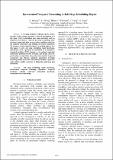Incremental temporal reasoning in job shop scheduling repair
Author(s)
Huang, Y.; Zheng, L.; Williams, Brian Charles; Tang, L.; Yang, H.
DownloadWilliams-2010-Incremental temporal reasoning in job shop scheduling repair.pdf (648.0Kb)
PUBLISHER_POLICY
Publisher Policy
Article is made available in accordance with the publisher's policy and may be subject to US copyright law. Please refer to the publisher's site for terms of use.
Terms of use
Metadata
Show full item recordAbstract
A working predictive schedule can be useless because of the various external or internal disruptions in a job shop. Total rescheduling may cause problems such as shop floor nervousness. Thus, the job shop scheduling repair (recovery) approach aims at generating a solution satisfying the updated constraints and making deviations minimized. We propose an incremental temporal reasoning approach in this paper to solve job shop scheduling repair problems. Specifically, such a problem is formulated as a disjunctive temporal problem (DTP), framed as an optimal constraint satisfaction problem (OCSP) formally, and finally solved by performing an algorithm integrating incremental temporal consistency and efficient candidate generation. Through involving human interactive mechanism, domain experts can make higher quality decisions by balancing makespan and deviations.
Date issued
2010-12Department
Massachusetts Institute of Technology. Computer Science and Artificial Intelligence Laboratory; Massachusetts Institute of Technology. Department of Aeronautics and AstronauticsJournal
IEEE International Conference on Industrial Engineering and Engineering Management (IEEM) 2010
Publisher
Institute of Electrical and Electronics Engineers
Citation
Huang, Y. et al. “Incremental temporal reasoning in job shop scheduling repair.” Industrial Engineering and Engineering Management (IEEM), 2010 IEEE International Conference on. 2010. 1276-1280. Copyright © 2010, IEEE
Version: Final published version
Other identifiers
INSPEC Accession Number: 11705978
ISBN
978-1-4244-8502-4
978-1-4244-8501-7
ISSN
2157-3611